|


Past Triple Crown Winners
These are the fabled Triple Crown Winners, eleven in all.
|
|
Sir Barton (1919)
Although he failed to win a race as a 2-year-old, Sir Barton became the first horse to win the Triple Crown. He won the Kentucky Derby by five lengths, the Preakness by four lengths and the Belmont by five, in American record time -- 2:17 2/5. At 4, Sir Barton had five victories in 12 races but lost a match with younger champion Man o'War.
|
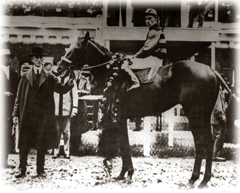 |
Gallant Fox (1930)
In a year he won the Triple Crown, Gallant Fox set a single-season earnings record that stood for 16 years. He's also the only Triple Crown winner to sire another Triple Crown winner (Omaha). Jockey Earl Sande came out of retirement to ride Gallant Fox at 3. Under Sande's excellent hands, Gallant Fox won the Wood Memorial by four lengths, the Preakness and the Kentucky Derby (in that order), and the Belmont Stakes by three lengths. After winning the Dwyer and the Arlington Classic, Gallant Fox was defeated in a historic upset at the Travers by 100-1 shot Jim Dandy. Gallant Fox had eight victories and a second in his nine starts during '30. |
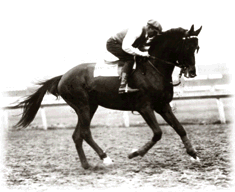 |
Omaha (1935)
Omaha, a large long-back colt, grew to 16.3 hands. After winning the Kentucky Derby, Omaha won the Preakness by six lengths and easily won the Belmont Stakes. At 4, Omaha was sent to England where he won the Victor Wild Stakes and the Queen's Plate, and finished second by a nose in the Ascot Gold Cup. Omaha was buried at the entrance to the Nebraska racecourse Ak-Sar-Ben.
|
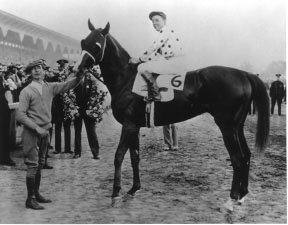 |
War Admiral (1937)
War Admiral won all eight starts as a 3-year-old, including the Triple Crown races. Before this horse, owner Samuel D. Riddle had always skipped the Kentucky Derby. In the Belmont, War Admiral stumbled near the start and tore away a small section of one front hoof. Despite this injury, he won the race by 3 lengths and equaled the track record. War Admiral was America's leading sire in 1945 and leading broodmare sire in 1962 and 1964. Eleven percent of his foals were stakes winners, including Hall of Famers Busher and Searching
|
 |
Whirlaway (1941)
Not only did Whirlaway capture the Triple Crown, he was a two-time Horse of the Year. That was after trainer Ben Jones designed a blinker to keep the colt from bolting to the outside rail, something Whirlaway liked to do early in his career. Whirlaway was the first horse to earn ,000 and retired as the world's greatest money earner. He went to stud at Calumet and then in France.
|
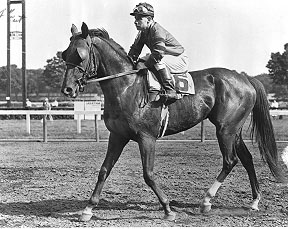 |
|
In 15 starts as a 2-year-old, Count Fleet never was out of the money. He did even better as a 3-year-old, winning the Kentucky Derby by 3 lengths, the Preakness by 8, and the Belmont by 25, all with John Longden aboard. Count Fleet became America's leading sire in 1951 and leading broodmare sire in 1963. He sired 38 stakes winners, including champions Counterpoint, Kiss Me Kate, One Count and Count Turf.
|
 |
|
Assault, who raced for 6 years, won the Kentucky Derby by eight lengths, the Preakness by a neck and the Belmont by three lengths over Natchez. By the end of his 3-year-old season, Assault's earnings eclipsed the one-season mark set in 1930. At 4, Assault's most impressive victory was over Stymie and Gallorette in the Butler Handicap.
|
 |
|
Citation (1948)
The first horse to earn more than a million dollars, Citation still holds the record for earning the most stakes races in a year, with 17 in 1948. Citation, ridden by Eddie Arcaro, became the second Triple Crown winner (joining Whirlaway) for Calumet Farm and the father/son training team of Ben and Jimmy Jones. After arthritis in the fetlock joint kept him sidelined at 4, Citation returned at 5 to set a world record in the Golden Gate Mile. He sired champion filly Silver Spoon and Preakness winner Fabius.
|
|
|
In any discussion on who is the best horse of the 20th Century, Secretariat is sure to get support. Horse of the Year at 2 and 3, Secretariat in '73 became the first Triple Crown winner in 25 years. He set track records in each of the three classics, including coming from last place to win the Kentucky Derby; coming from last to first on the first turn of the Preakness; and winning the Belmont by 31 lengths. In '92, Secretariat was the leading broodmare sire.
|
 |
|
Seattle Slew was 'a real stud' in every sense of the word. On the track, he was a champion at 2, 3 and 4, and won the Triple Crown in '77. In retirement, he sired stakes winners that included Slew o' Gold and Swale. Purchased by the Taylor and Hill families or just ,500, Seattle Slew earned more than $1 million in purses. He suffered from a serious viral infection at 4 but returned to defeat younger champion, Affirmed, in the Marlboro Cup.
|
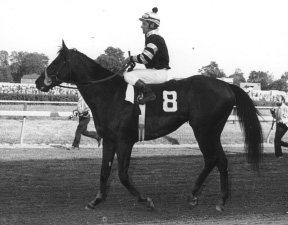 |
|